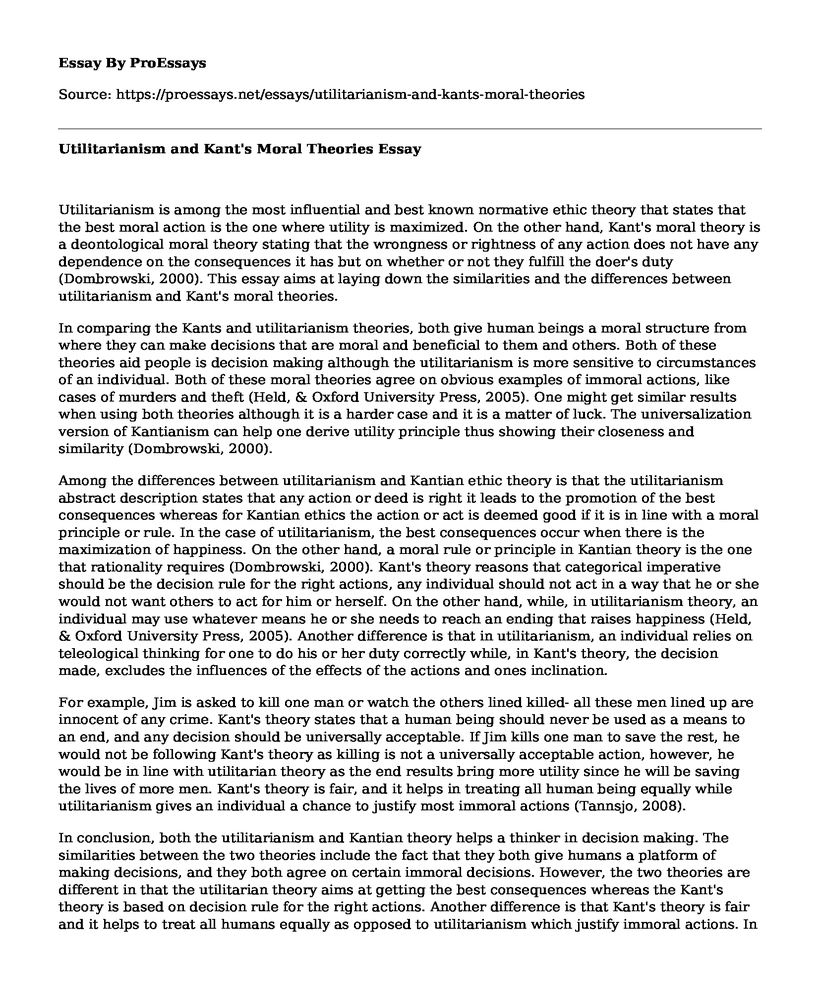Utilitarianism is among the most influential and best known normative ethic theory that states that the best moral action is the one where utility is maximized. On the other hand, Kant's moral theory is a deontological moral theory stating that the wrongness or rightness of any action does not have any dependence on the consequences it has but on whether or not they fulfill the doer's duty (Dombrowski, 2000). This essay aims at laying down the similarities and the differences between utilitarianism and Kant's moral theories.
In comparing the Kants and utilitarianism theories, both give human beings a moral structure from where they can make decisions that are moral and beneficial to them and others. Both of these theories aid people is decision making although the utilitarianism is more sensitive to circumstances of an individual. Both of these moral theories agree on obvious examples of immoral actions, like cases of murders and theft (Held, & Oxford University Press, 2005). One might get similar results when using both theories although it is a harder case and it is a matter of luck. The universalization version of Kantianism can help one derive utility principle thus showing their closeness and similarity (Dombrowski, 2000).
Among the differences between utilitarianism and Kantian ethic theory is that the utilitarianism abstract description states that any action or deed is right it leads to the promotion of the best consequences whereas for Kantian ethics the action or act is deemed good if it is in line with a moral principle or rule. In the case of utilitarianism, the best consequences occur when there is the maximization of happiness. On the other hand, a moral rule or principle in Kantian theory is the one that rationality requires (Dombrowski, 2000). Kant's theory reasons that categorical imperative should be the decision rule for the right actions, any individual should not act in a way that he or she would not want others to act for him or herself. On the other hand, while, in utilitarianism theory, an individual may use whatever means he or she needs to reach an ending that raises happiness (Held, & Oxford University Press, 2005). Another difference is that in utilitarianism, an individual relies on teleological thinking for one to do his or her duty correctly while, in Kant's theory, the decision made, excludes the influences of the effects of the actions and ones inclination.
For example, Jim is asked to kill one man or watch the others lined killed- all these men lined up are innocent of any crime. Kant's theory states that a human being should never be used as a means to an end, and any decision should be universally acceptable. If Jim kills one man to save the rest, he would not be following Kant's theory as killing is not a universally acceptable action, however, he would be in line with utilitarian theory as the end results bring more utility since he will be saving the lives of more men. Kant's theory is fair, and it helps in treating all human being equally while utilitarianism gives an individual a chance to justify most immoral actions (Tannsjo, 2008).
In conclusion, both the utilitarianism and Kantian theory helps a thinker in decision making. The similarities between the two theories include the fact that they both give humans a platform of making decisions, and they both agree on certain immoral decisions. However, the two theories are different in that the utilitarian theory aims at getting the best consequences whereas the Kant's theory is based on decision rule for the right actions. Another difference is that Kant's theory is fair and it helps to treat all humans equally as opposed to utilitarianism which justify immoral actions. In utilitarianism, an individual relies on teleological thinking in his or her action while Kant's theory excludes influences of the effects of the actions. The Kantian theory is a more practical option for an individuals daily life as it offers lesser flaws than the utilitarian theory. The utilitarianism provides ways of justifying ones dreadful actions opening chances of abuse.
References
Dombrowski, Paul.(2000). Ethics in Technical Communication. The Allyn & Bacon Series in Technical Communication: Boston & London.
Held, V., & Oxford University Press. (2005). The ethics of care: Personal, political, and global. New York: Oxford University Press.
Tannsjo, T. (2008). Understanding ethics: An introduction to moral theory. Edinburgh: Edinburgh University Press.
Cite this page
Utilitarianism and Kant's Moral Theories. (2021, Mar 04). Retrieved from https://proessays.net/essays/utilitarianism-and-kants-moral-theories
If you are the original author of this essay and no longer wish to have it published on the ProEssays website, please click below to request its removal:
- Research Paper Action Plan Code of Ethics of the Elementary School
- Wisdom Is Pursued: Socrates and Oracle Paper Example
- Different Forms of Government Presented by Aristotle and Confucius Essay
- Ethics and Truth in Religion - Essay Sample
- Essay Example on Cultural Immersion in Cincinnati: Rich Cultural Identity
- Essay Sample on Ain't I a Diva?: Exploring Beyonce's Phenomenon & Cultural Impact
- Essay Example on Managers: Embracing Ethics for Long-Term Success







